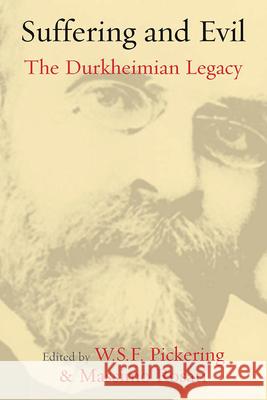Suffering and Evil: The Durkheimian Legacy » książka
Suffering and Evil: The Durkheimian Legacy
ISBN-13: 9781845455194 / Angielski / Twarda / 2008 / 204 str.
Suffering and Evil: The Durkheimian Legacy
ISBN-13: 9781845455194 / Angielski / Twarda / 2008 / 204 str.
(netto: 485,11 VAT: 5%)
Najniższa cena z 30 dni: 498,70
ok. 30 dni roboczych.
Darmowa dostawa!
Until recently the subject of suffering and evil was neglected in the sociological world and is almost absent in Durkheimian studies as well. This book aims to fill the gap, with particular reference to the Durkheimian tradition, by exploring the different meanings that the concepts of evil and suffering have in Durkheim's works, together with the general role they play in his sociology. It then examines the meanings and roles of these concepts in relation to suffering and evil in other authors within the group of the Annee sociologique up until the beginning of World II. Finally, the Durkheimian legacy in its wider aspects is assessed, with particular reference to the importance of the Durkheimian categories in understanding and in conceptualizing contemporary forms of evil and suffering. W.S.F. Pickering was a founder member in 1991, and then General Secretary, of the British Centre for Durkheimian Studies in the Institute of Social and Cultural Anthropology, Oxford University. Since the 1970s he has written, edited and helped translate various books on Durkheim and his disciples. Massimo Rosati teaches the History of Sociology at the University of Salerno, Italy. His last book in Italian is Solidarieta e sacro (2002). He has published articles on Durkheim and Habermas in the Journal of Classical Sociology and in the Durkheimian Studies. He is the editor of the new Italian edition of Durkheim's The Elementary Forms of Religious Life.
Until recently the subject of suffering and evil was neglected in the sociological world and is almost absent in Durkheimian studies as well. This book aims to fill the gap, with particular reference to the Durkheimian tradition, by exploring the different meanings that the concepts of evil and suffering have in Durkheims works, together with the general role they play in his sociology. It then examines the meanings and roles of these concepts in relation to suffering and evil in other authors within the group of the Année sociologique up until the beginning of World II. Finally, the Durkheimian legacy in its wider aspects is assessed, with particular reference to the importance of the Durkheimian categories in understanding and in conceptualizing contemporary forms of evil and suffering.W.S.F. Pickering was a founder member in 1991, and then General Secretary, of the British Centre for Durkheimian Studies in the Institute of Social and Cultural Anthropology, Oxford University. Since the 1970s he has written, edited and helped translate various books on Durkheim and his disciples.Massimo Rosati teaches the History of Sociology at the University of Salerno, Italy. His last book in Italian is Solidarietà e sacro (2002). He has published articles on Durkheim and Habermas in the Journal of Classical Sociology and in the Durkheimian Studies. He is the editor of the new Italian edition of Durkheims The Elementary Forms of Religious Life.











